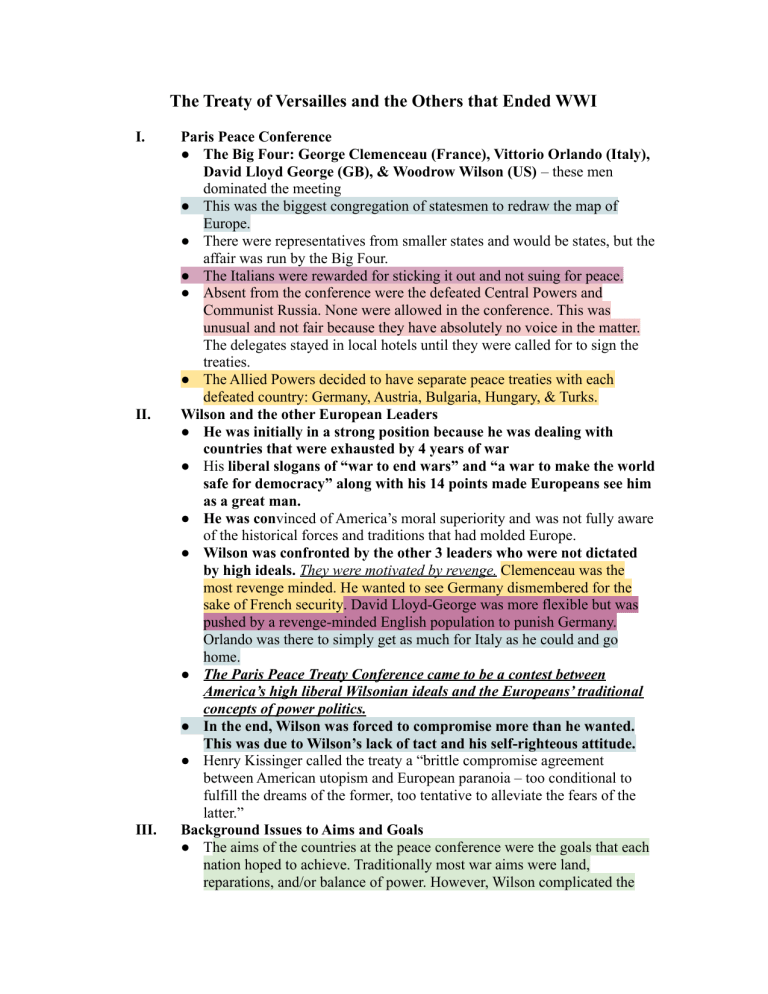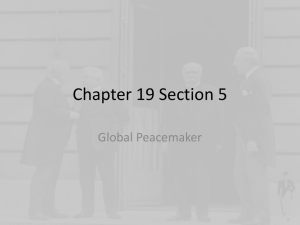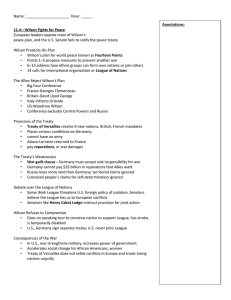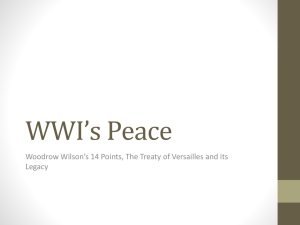
The Treaty of Versailles and the Others that Ended WWI
I.
II.
III.
Paris Peace Conference
● The Big Four: George Clemenceau (France), Vittorio Orlando (Italy),
David Lloyd George (GB), & Woodrow Wilson (US) – these men
dominated the meeting
● This was the biggest congregation of statesmen to redraw the map of
Europe.
● There were representatives from smaller states and would be states, but the
affair was run by the Big Four.
● The Italians were rewarded for sticking it out and not suing for peace.
● Absent from the conference were the defeated Central Powers and
Communist Russia. None were allowed in the conference. This was
unusual and not fair because they have absolutely no voice in the matter.
The delegates stayed in local hotels until they were called for to sign the
treaties.
● The Allied Powers decided to have separate peace treaties with each
defeated country: Germany, Austria, Bulgaria, Hungary, & Turks.
Wilson and the other European Leaders
● He was initially in a strong position because he was dealing with
countries that were exhausted by 4 years of war
● His liberal slogans of “war to end wars” and “a war to make the world
safe for democracy” along with his 14 points made Europeans see him
as a great man.
● He was convinced of America’s moral superiority and was not fully aware
of the historical forces and traditions that had molded Europe.
● Wilson was confronted by the other 3 leaders who were not dictated
by high ideals. They were motivated by revenge. Clemenceau was the
most revenge minded. He wanted to see Germany dismembered for the
sake of French security. David Lloyd-George was more flexible but was
pushed by a revenge-minded English population to punish Germany.
Orlando was there to simply get as much for Italy as he could and go
home.
● The Paris Peace Treaty Conference came to be a contest between
America’s high liberal Wilsonian ideals and the Europeans’ traditional
concepts of power politics.
● In the end, Wilson was forced to compromise more than he wanted.
This was due to Wilson’s lack of tact and his self-righteous attitude.
● Henry Kissinger called the treaty a “brittle compromise agreement
between American utopism and European paranoia – too conditional to
fulfill the dreams of the former, too tentative to alleviate the fears of the
latter.”
Background Issues to Aims and Goals
● The aims of the countries at the peace conference were the goals that each
nation hoped to achieve. Traditionally most war aims were land,
reparations, and/or balance of power. However, Wilson complicated the
IV.
traditional peace process with his want to create an environment of
permanent peace rather than create a winner’s treaty.
● There were some background factors which influenced the participants.
These were events or ideas that the countries could not control but
which they had to be aware of in their decision making.
● Bolshevism/Communism: Communism was seen as potential threat to
liberalism. It was believed that it would spread into Europe (& the US).
The countries would have to try to stop its spreading and try to address
some of the grievances that might attract populations to the communist
ideology.
● Idealism v. Realpolitik: The war itself was different from others, not only
in size and devastation, but also in its introduction to grandiose ideas.
Wilson brought an idealism that was an entirely new concept at peace
conferences. Peace conferences had always dealt with concrete issues.
Delegates were used to changing boundaries, setting indemnities, and
adjusting balance of power through realpolitik. Wilson brought an
assumption that war could be prevented entirely if people would just make
an effort. This idealistic tone that many European citizens had embraced
raised expectations that would be hard to satisfy.
● Liberalism/Democracy: The states making the decisions were all liberal
nations (something not seen at peace conferences before). That meant that
the representatives at the conference would be influenced by popular
opinion in their countries. During the war, the leaders of these countries
had promised great things to their people to maintain support for the war.
The yellow journalism in these countries had run rampant in their
portrayal of the enemy. The propaganda, speeches, media, etc…were
created to excite, enrage, and encourage people during the war. When it
was time for peace the emotions of the people would have to be satisfied
in some way (can we say, “revenge”?). This played a role in the
demands/positions that leaders took during the conference.
● Geopolitical (the influence of demographics and/or geography on
politics): Empires had collapsed during the war. In the Middle East there
was a complete power vacuum because the Ottoman Empire had
collapsed. The boundaries would have to change, new countries would
need to be created, country sizes would change dramatically…all of these
will have a profound effect on the geopolitical situation in Europe.
● Wilson was not the only one who was idealistic. Many of the
representatives wanted to insure that this would not happen again.
Idealism and revenge were somehow to be combines into the same
documents. Ultimately, the treaties were an awkward compromise between
these conflicting ideas.777
US Aims: Fourteen Points
● Wilson announced his war aims in front of a joint session of Congress in
January of 1918.
V.
● The US’s aims weren’t the traditional aims of land, power, and money.
They were designed to create a peaceful world by removing the
reasons for war.
● Wilson’s specific aims did call for some punishment to Germany. It also
called for a probation period before Germany would be allowed into the
League of Nations. His aims mainly called for freedom of the seas,
self-determination, spreading of democracy, creation of new countries,
a call for no more secret treaties, and equality in trade.
● The Central Powers had surrendered on the assumption that Wilson’s 14
points would be the basis of the Peace Treaty and Germany had been
given a specific promise to this effect.
● However, to gain support of his Allies, Wilson was forced to go back on
certain points: open and fair negotiations, freedom of seas, adjustment
of all colonial claims scraped as Germany’s colonies were divided by
victors, stipulation that Poland would be made up of Poles solely,
self-determination idea was often scraped.
● Wilson was criticized because he didn’t stand up against the others. They
other countries were exhausted (broke, dead, etc..). Prior to war we were a
debtor nation, after the war we were a creditor nation and the most
powerful nation. Wilson could have played major hard ball. The US had to
money, resources, etc…to pressure the other countries. However, he
agreed to drop or water down most points except the League of Nations.
● One reason why Wilson watered down or abandoned some ideas was
because he felt that these details could be ironed out later by the
League…a spirit of cooperation in the League would lead to changes.
● Results: The Germans felt deceived and the Allies, especially Wilson, had
acted in bad faith.
Everyone Else’s Aims
● Great Britain: Many of their aims were traditional. 1)eliminate the
German fleet 2)end of the German Empire as a potential source of conflict
3) a return to normal European relations and trade that would restore GB’s
economy and act as a defense against Communism 4) They did not want
to get involved in any alliance in Europe on behalf of any country
(intervene only when threatened) 5) No French obtaining of land except
Alsace-Lorraine (might upset balance of power) 6) declaration of German
war guilt 7) wanted Germany to pay extensive reparations.
● France: France’s aims were made during a time of fear…they wanted
security against Germany. France believed that she would not be able to
defend herself if Germany returned to its pre-war strength. 1)extensive
German disarmament 2)Germany territorial reduction 3)heavy reparations
to weaken the German economy 4) recover Alsace-Lorraine 5) France also
wanted to try to control Luxembourg and Belgium 6) create a puppet state
west of the Rhine 7) control the Saar region of Germany {#’s 5, 6 ,7 would
create a buffer zone} 8) an alliance with GB and US written into the
treaty. They wanted concrete measures…not vague guarantees by a
League of Nations.
VI.
● Italy: They just wanted territory that had been promised to them. They
were to receive the Dalmatian Coast, Trieste, & South Tyrol. These
areas had been promised to them and they wanted the deal to be honored.
Orlando will walk out of the conference when some areas aren’t
granted to him.
● Japan: Yea, they fought in the war. They wanted recognition for their
dominant position in China. They also wanted possession of the former
German territories in China. They had captured those territories during
the war and wanted them as a reward for contributing to the war
effort.
● German: They wanted a treaty based on the 14 Points. Germany had
not been defeated (truly, only an armistice) or invaded. In fact, they
occupied areas of France and Belgium. Therefore, they could have
expected some form of a compromise peace by which neither side
dominated. They expected to be present at the conference. They expected
some territorial loss and sanctions, but they did not expect to be
humiliated and severely punished.
Treaty of Versailles
● The treaty contained 440 clauses. The
● y included military, economic, and territorial terms.
● The Covenant of the League of Nations. Each of the treaties contained
this. This contained the principles on which the League was to
operate. All nations upon entering the League had to agree to these terms.
● Alsace-Lorraine lost to France
● part of Northern Germany lost to Denmark
● 384 square miles to Belgium
● The area of Saar was to administered by the League
● the Rhineland area was demilitarized
● Poland was created with parts of Germany (Upper Silesia and Western
Prussia). About 1 million Germans were part of Poland at that point.
● Danzig: Poland needed a port so they wanted the German port of Danzig.
Instead it becomes an international city owned by the League of
Nations. This was known as the Polish Corridor.(split between
germany and great britain.
● Part of Germany went to Lithuania
● Germany had lost 13% of its land including mining areas of Alsace and
Silesia.
● Colonies were divided up between the league. German claims in
Shandong, China were to be turned over to Japan (not China). China was
very upset over this.
japan captures all of germany influences in asia. lost land
● Standing army could be no more than 100,000 men and the navy was
reduced to 15,000. Conscription came to an end as well.
● The Treaty of Brest-Litovsk was considered void and Germany was to
withdraw from the Baltic areas.
VII.
● Couldn’t build offensive weapons (poison gas, tanks, armored cars,
machine guns, etc…)
● The Brits were to receive a lot of German ships, but the Germans
exploded them instead of turning them over. Germany was allowed to
keep some naval ships (for example, they were allowed to keep 6
battleships).
● Germany had to accept the “War Guilt Clause.” (Article 231) It stated
that the Germans had started the war (evexn though they didn’t…they
fell into like the rest of Europe). Because they started it, the Germans
would have to pay the Allies $35 billion in reparations. The terms of the
treaty were based on the acceptance of the clause.
● The Germans could not pay that because of the blockade and war had
hurt their economy. The Allies required them to surrender a large
amount of livestock, 40 million tons of coal over a 10 year period (a lot
of their coal mines were lost to France and Poland), and most of their
merchant marines. They were also required to build 200,000 ships
tonnage annually for 5 years for Allies.
● The Kaiser was to be tried as a war criminal. However, the Dutch
refused to turn him over.
● The blockade would remain until they agreed to sign the treaty. Despite
protests from the Germans that the treaty violated the armistice terms, they
were forced to sign or the Allies would attack.
● Signed June 28, 1919
Harsh Treaty
● If it had not been for Wilson along with, occasionally, David Lloyd
George, the treaty would have been harsher due to Clemenceau’s
influence.
● Wilson compromised too much to insure that the League if Nations was
created. He thought the League would solve the bitterness created with the
treaties. Ironically, the US never joined the League because the Senate
rejected the treaty. The USSR and the Central Powers were not allowed in
it either.
● The Germans were very bitter when the treaty was presented…especially
the War Guilt Clause. (germany angry about war clause , they didn't want
to ingoage that they started the war.)
● They had not been given a chance to negotiate the terms, and were forced
to sign it. The treaty became a source of humiliation and was called
“diktat” (the German term for the treaty meaning that the treaty was
dictated and was too harsh) by Germans.
● Also, Germany was excluded in the idea of self-determination. She had
lost millions of ethnic Germans in the lands created. This had been a pillar
of Wilson’s 14 Points.
● The imposition of reparations on Germany deprived them of 15% of her
agricultural land, 16% of her coal, 14% of her iron ore, and 10% of her
industry. This helped an economic crisis occur after the war.
VIII.
IX.
X.
XI.
XII.
XIII.
● The terms were so hated that no future government was able to accept
them. The treaty was rejected by the German people who wanted to see it
revoked/revised. But, no German government could agree how to do this.
(Extreme like Hitler or moderate like Stresemann). But, one thing that all
groups could agree on is that they wanted to find a way to get out of the
burdens placed on them.
Treaty of St. Germain-en-Laye (Austria)
● Resulted in dismembering the Austrian Empire
● Covenant of the League of Nations
● Creation of many new nations with their land: Czechoslovakia,
Yugoslavia (Serbia was happy), Poland, Hungary, Austria
● In all Austria lost ¾ of her land and 4 million of its 10 million population
to other countries.
● Austria was required to reduce arms, pay war bill (reparations), and no
submarines (that’s ok since they don’t have a coast). Their navy was
essentially destroyed. Their army was reduced to 30,000.
● Had to get rid of the Hapsburgs and become a republic/democratic
government
● Trieste and parts of the Dalmatian Coast were ceded to Italy.
● Article 88 stated that Austria could not compromise their sovereignty.
This was designed to keep Austria from unifying with Germany.
Treaty of Trianon (Hungary)
● The Covenant of the League of Nations
● Article 73 stated that Hungary could not compromise their sovereignty.
This was designed to keep Hungary from unifying with Germany.
● give their land and population to Rumania and Yugoslavia.
● They also had to reduce their arms and pay a war bill.
Eastern Europe
buffer zone used by allie powers to prepare ad used by russia to spread
communism )????check sacrificial land
● Czechoslovakia, Rumania, Yugoslavia were allowed to form states even
though they had serious minority problems…these countries included
populations from other countries.
● The collapse of the Russian Empire caused a rise of independent states.
Finland, Estonia, and Latvia were all created.
● The new countries are weak, filled with minorities, new governments,
and it’s hard to thwart outside pressures. Essentially, there is a power
vacuum in Eastern Europe. leads to potential uprisings.
Treaty of Neuilly (Bulgaria)
● The Covenant of the League of Nations
● Lost Macedonia to Yugoslavia. Also lost land to Greece and Rumania.
● Lost a lot of their population to these places.
● Reduce army to 20,000 and pay $400 million in reparations.
Treaty of Sevres (Turkey)
● The Covenant of League of Nations
● Reduction in military and reparations to be paid.
XIV.
● The Middle East was carved up between Britain and France. She also
lost land to Greece, Bulgaria, and Italy.
● Armenia was made independent.
● The Straits were put under the control of an international commission.
● Allowed the coastal Greeks (about 1 million) in Turkey to create a
government. So they invite the real Greeks to come over and grab some
land. In essence, the Greeks are lording over the Turks.
● 1920: The Turkish Nationalists, led by Mustafa Kemal, rebelled against
the Greeks(the They were attempting to create an exclusively Turkish
state. They re-conquered Armenia, drove the Greeks from Turkish
mainland, overthrew the sultan and established a republic. The Greeks
tried to get help from France and Britain but they don’t help them. They
were too tired and the Allies were also divided on who they supported.
They were forced to revise the treaty.
● (revised treaty) Treaty of Lausanne (1923): the Turks got Armenia back
and were able to keep the coast for themselves. No restrictions on their
military. All reparations were cancelled. The Straits were demilitarized
under Turkish control. They ended up expelling around 1.3 million
Greeks back to Greece.
● Turkey was the only defeated nation to rebel against the treaties from
WWI. They were able to get a better deal.
Overall Effects
● Several new countries were created with the treaties. The big problem was
that peoples weren’t with their countries…no chance of self-determination
working if peoples aren’t with their own countries. There was a
mish-mash of Europeans everywhere. These new countries held unhappy
minorities who would prove to be a source of internal strife.
● The treaties, in some respects, allowed Germany to be stronger than their
pre-war strength. With the collapse of the Austro-Hungarian Empire and
temporary collapse in Russia, a balance of power shift had occurred in the
East. The small, weak countries with unhappy minorities that had been
created allowed a power vacuum to develop that Germany would be too
tempted to fill. (Germany was the only true major power in Eastern
Europe.) Basically, Germany’s eastern borders were next to weak folks
that could easily be swallowed.
● The Allies were pleased with the new countries. They had become worried
about Russia. They had created a “buffer zone” with the new states = the
Cordon Sanitare (belt of space).
● The terms of the treaties were so harsh that they laid the foundation
for future problems…ultimately leading to WWII and Germany’s want
for revenge.








